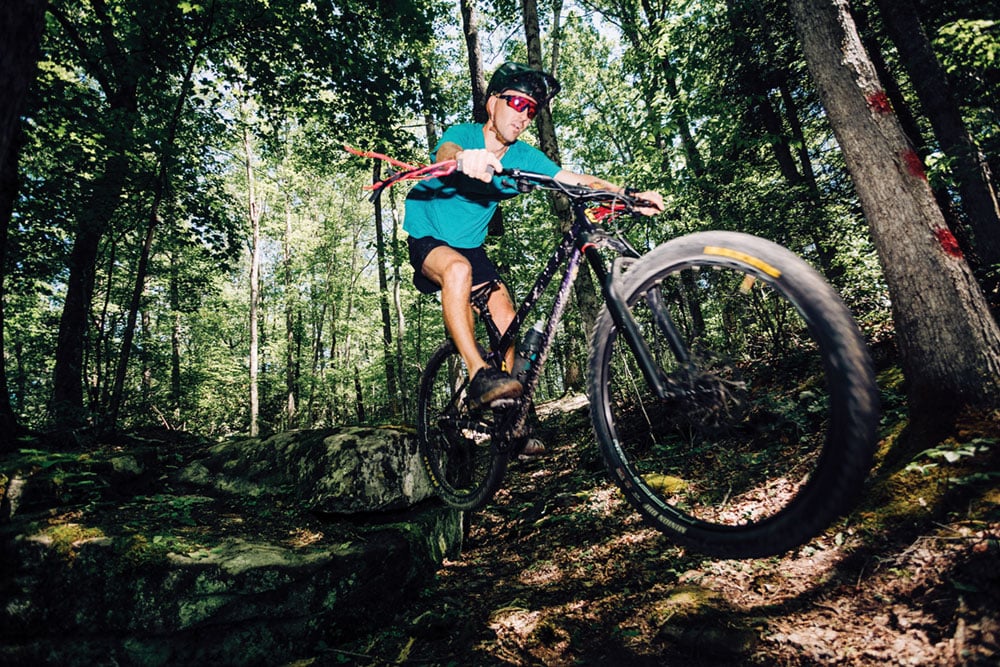In the midst of a global pandemic, the West Virginia town built 17 miles of singletrack in six months. And they’re just getting started.
Last October, the West Virginia adventure hub of Fayetteville rekindled an otherwise dark year with a bright light: the opening of Wolf Creek Trails. Tucked up on a hill three miles south of town, the 17-mile network of singletrack is Fayetteville’s largest purpose-built trail system and the first of its kind to be constructed for public use outside of federal public lands.
“Fayetteville has always been known as a whitewater and climbing destination,” says Abbie Newell, Fayette County assistant resource coordinator and president of the Fayette Trail Coalition. “Now we’re adding [mountain bike] trails, which will truly make this place a multi-day, multisport destination.”
While the Wolf Creek Trails are the newest mountain bike-friendly singletrack in town, they’re hardly the first. People have been riding in Fayetteville since New River Bikes opened its doors in 1989. But back then, says New River Bikes owner Andy Forron, the riding was limited to old logging roads and multi-use trails.
“The mountain biking was not that good,” says Forron, “but we had a bit of a scene because there were so many other outdoor activities and most people owned a bike. But for years, if you wanted to ride good stuff, you had to leave town.”
That sentiment seemed to shift when the multi-use Arrowhead Trails opened on national park property in 2011. Constructed by the Boy Scouts of America, the 12.8-mile stacked loop trail system weaves along the ridges high above the New River Gorge. Fast and flowy, Forron says the Arrowhead Trails were popular at first and still are among visiting and novice riders. But 10 years later, local enthusiasm for riding at Arrowhead has waned. That’s largely been fueled by frustrations with cumbersome park service processes for addressing trail maintenance and grievances over a lack of trail expansion.
“A lot of us have worked with the park service for a long time,” says Gene Kistler, vice president of Fayette County Urban Renewal Authority (URA) and president of the New River Alliance of Climbers. “It’s gotten tougher to get anywhere working on projects with the park service.”
In 2018, the Summit Bechtel Family National Scout Reserve, located just 11 miles outside of Fayetteville, opened its privately owned 35 miles of mountain bike trails. As promising as that newfound access seemed, public use was limited to the off-season winter months and only to members of the Mountain State Trail Alliance, a local nonprofit that promotes rail-trail development. Public access to these trails has since been suspended due to COVID-19 restrictions.
What Fayetteville riders needed, and so desperately wanted, was a blank slate of land close to town where they could build a mountain bike system on their own terms and free from federal oversight. And in 2016, the community got just that in Wolf Creek Park.
Purchased by the URA in 2004, Wolf Creek Park was originally slated to become a live-work-play community. At 1,064 acres in size, the former underground mining site was ripe with potential. Only minutes from the amenities of town and easily accessible by a major highway, Wolf Creek seemed the perfect place to locate new businesses and residential developments. URA’s vision for Wolf Creek Park promised to bolster the local economy and provide affordable housing for county residents. But when the housing crisis hit in 2008, those aspirations came to a screeching halt.
“That put a huge damper on development at Wolf Creek Park,” says Gabriel Peña, Fayette County’s deputy resource coordinator. “In some instances, we’re still trying to recover from the housing crash. That, combined with the decline of coal in West Virginia, made Wolf Creek a tough sell for potential employers [looking to relocate].”
Though coal has been declining, outdoor recreation has been on the rise. According to the Outdoor Industry Association, the outdoor recreation economy brings in $9 billion annually to West Virginia. Kistler took that number to the Fayette County Commission and, with the backing of the URA, the Fayette County Resource Coordinator’s Office, and the local community, together they convinced county commissioners to invest in trail development at Wolf Creek.
“Wolf Creek was just county land laying there doing nothing,” says Kistler. “There’s a lot of opportunity there and what we’ve always wanted is more trails.”
The community got to work. For three years, locals flagged and brushed the corridor. Monthly volunteer trail days saw upwards of 40 people donating their time and labor to ensure Wolf Creek came to fruition. In 2020, the URA used $150,000 of reallocated coal severance tax funds to hire SC Resources to build the first phase of Wolf Creek. In a matter of six short months, the full-time three-man crew built an astounding 17 miles of singletrack. And according to Sam Chaber, SC Resources owner-operator, that’s just the beginning
“This is just the tip of the iceberg in getting more trails, and a different vision of what trails can be, in Fayetteville,” says Chaber. “We need to hit the whole spectrum of trails to truly be a destination, and I have no doubt we can put at least an additional 17 miles of trails [at Wolf Creek].”
At times flowy and non-technical, at others bejeweled with rock gardens and wooden features, the trails at Wolf Creek are a testament to Fayetteville’s unique spirit of adventure. With the recent redesignation of the New River Gorge as a national park and preserve, the timing of Wolf Creek’s opening perfectly positions Fayetteville as the ultimate mountain town, home to a world-class trifecta of outdoor recreation.
The county plans to continue trail construction at Wolf Creek and is currently reviewing proposals for phase two, which it hopes to begin building later this year. In addition to Wolf Creek, three other properties in the county will see new trail construction: Fayetteville Town Park, Fayette County Park, and Needleseye Park in nearby Oak Hill.
Together, these four trail initiatives could bring more than 50 miles of multi-use singletrack to the county.
The challenge now will be to find the funding—at the end of 2019, Fayette County Commission decided not to continue reallocating coal severance tax funds to the URA, which had been the sole source of funding for construction at Wolf Creek. Peña says he’s hopeful the progress thus far will act as leverage in securing future grants for trail development.
“Wolf Creek was kinda stuck in the mud before these trails came along and reinvigorated that park,” says Peña. “Continuing to grow trails around here fits in so well with the [national park] redesignation. All of these things are really starting to generate some momentum, which in turn is generating a higher quality of life and economic opportunity for folks who want to work and play here.”
Cover photo: A mountain biker rides the new wolf creek trails in West Virginia. Photo by Chris Jackson








